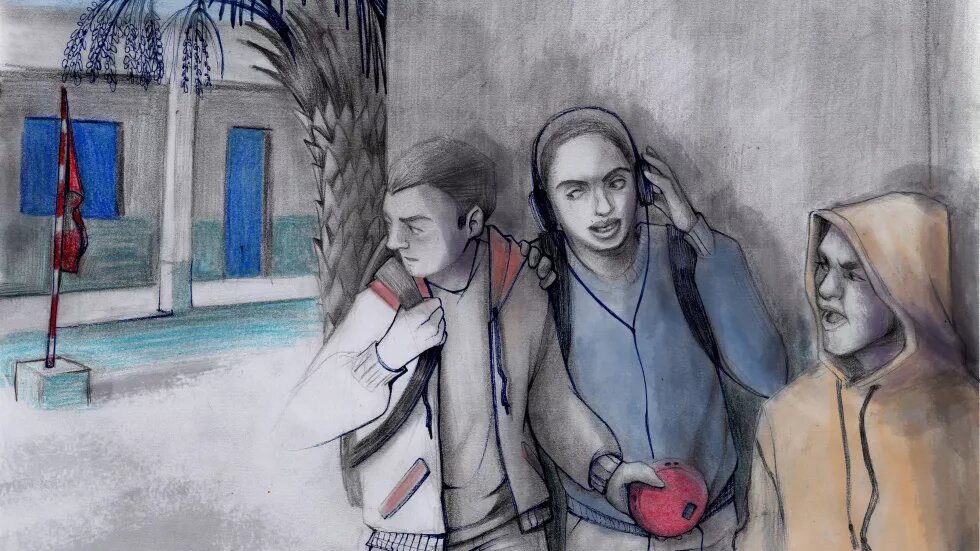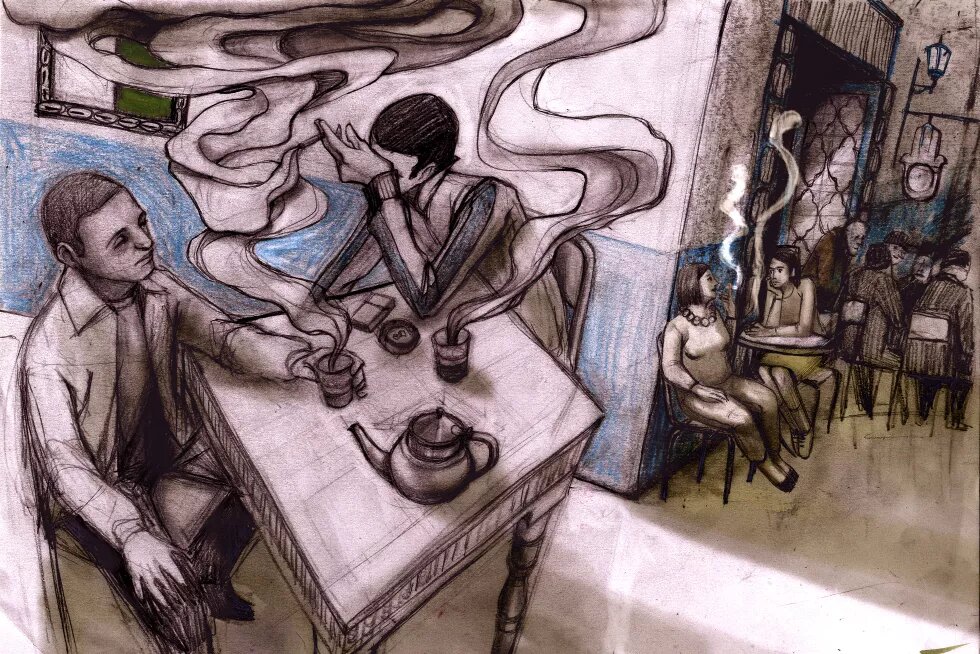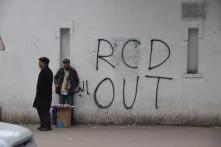
Strictly speaking, Ramy Khouili missed out on the big demo back then in Tunis. The streets were so packed that he couldn’t get into the centre with his friends. The night before January 13th they were so excited they could barely sleep. Still, early the next morning they couldn’t get through the side streets into the large Avenue Bourguiba, in the heart of the capital. The whole country seemed to be on its feet. On January 14th, 2011 the masses suddenly heard the news that the long-time dictator, Zine el-Abidine Ben Ali was in an aeroplane with his wife, Leila Trabelsi, and his closest associates, on his way to Saudi Arabia.
The people had toppled the dictator – and could hardly believe it.
»A friend called me up on January 13th, 2011,« Khouili remembers. »He told me: Ramy, let’s go back on the streets and demonstrate for our rights and freedom! To say that on the phone, in a country where everyone and everything was under surveillance, was more than daring.«
We were so young and thought: Maybe we’re going too far?
Ramy Khouili is an impressively eloquent person who tells stories with clarity and care. Yet, when he reflects on the thrill of those days you quickly realise how cautious he is in putting probably the greatest moment of his life into words. When Ramy Khouili, then 20 years old, was stuck in the centre of Tunis with his friends, unable to move forward, he was fearful of his future. At the same time, he thought: »This demonstration is my future.« Of course, they were all really scared, said Khouili. »We were so young and thought: Maybe we’re going too far?«
Each day slowly chipped away at the myth of the almighty police state until the fear – the regime’s most effective method of control – dropped away. Everything came to a standstill in Tunisia; school exams, factories, family events. If you weren’t part of the regime, you went on a demo. And Ramy Khouili was in the thick of it: »Our main lesson as Tunisians was that the Ben-Ali regime was good at presenting itself as a police state. There wasn’t much behind the facade.«
The lesson was: If you protest, you’ll be beaten up.
He remembers »those crazy days« in December 2010 and January 2011 like they were yesterday, says Khouili on the telephone. The 31-year old activist was preparing for university exams back then. The main lesson instilled into young Tunisians at the time: No one may go on demonstrations, nor demand their rights, nor think politically.

Back in school Khouili used to hide away with his friends to listen to music critical of the regime.
Prohibited CDs and MP3s with political rap songs were discretely passed around the schoolyard.
It was the ultimate kick because it was so easy to get caught.
The satirist and musician Bendir man (his pseudonym means: The man with the tambourine) was one of Ramy Khouili’s favourite artists. His texts expressed exactly what Ramy and the Tunesian youth were feeling: »We are the 99% and we’ve had enough of your democracy.« Artists such as Bendir man gave young people courage and showed them that it was possible to be critical.
Khouili’s school was in the centre of Tunis, just a short walk from the interior ministry, the heart of the police state under Ben Ali. Occasionally Ramy Khouili saw how activists, despite the repression, would organise sit-ins there only to be brutally beaten-up and arrested. The regime wanted young people like Ramy to always have the images of demonstrators who’d been arrested and abused in their minds. »The lesson was: If you protest, you’ll be beaten up,« says Ramy Khouili.
Still, the revolution finally managed to get underway. The images of repression, the psychological terror wrought by the regime, and the politics of deterrence had lost their grip. The first demonstrations in 2010 and 2011 made the young Ramy Khouili proud of what he had achieved with millions of other Tunisians. They didn’t know what lay around the corner, but they did know that they had written history. When they woke up realising water was still running in the taps, the electricity was still working and people were still alive the day after the regime had been toppled on January 15th, they realised it had been the right decision to conquer their fear: »I was just relieved,« says Khouili.
Khouili has worked for many organisations in different political fields over the last ten years; in HIV prevention, the protection of minorities, and regarding the EU neighbourhood policy. He tells the story of a process of democratisation of a society which learned along the way and could be seen as a model for the whole region. Ramy Khouili, however, is very clear on his position: »I don’t believe in the Tunisian exception lots of people talk about.« Political commentators have used this term to explain the success of the Tunisian revolution in comparison to the other democracy movements in North Africa and the Middle East. »Trying to define what the Tunisian exception is gets you nowhere because the context of each state is so entirely different,« says Khouili.
For example, Tunisia was never the target of military or international interventions after 2011. Khouili has a great talent for making the complex coherent. Tunisia had neither an omnipotent military apparatus nor an omnipresent monarchy. Khouili strongly argues that each State should be considered individually and the efforts of the different democracy movements should be appreciated. In his view, it is correct that Tunisian society tried to advance early on. Slavery, for example, was already officially abolished in the 19th century. After 2011, however, it was the economic disparities between different regions of Tunisia which set off the movement and finally brought the regime to its knees. The desperate suicide of the fruitseller, Mohamed Bouazizi, in the small town of Sidi Bouzid, was emblematic of the former regime’s neglect of the poor and the rural areas.

Bouazizi’s anguish also made Khouili wake up to how fragile life in rural Tunisia had become – and partly still remains.
The pressure on Tunisian youth in 2011 got so unbearable that they were only left with three options: To shut their ears and look away, to commit an act of desperation, or start a revolution.
»The big cities, particularly the inhabitants of Tunis, were merely picking up the tail of the rebellion which started in the provinces,« says Khouili.
He doesn’t leave the European perspective out of his analysis either and will never forget a foreign attempt to intervene. Whilst he and his friends were risking their lives on the streets at the start of 2011, the then French government of the centre-right President, Nicolas Sarkozy, offered the Ben-Ali regime technical and political expertise to help crush the popular uprising. »We can offer the knowledge of our security forces to sort out the security situation [in Tunisia]« said Sarkozy’s then foreign minister, Michèle Alliot-Marie at the Assemblée Nationale in Paris. Alliot-Marie had excellent contacts within the Ben-Ali regime and was good friends with a handful of influential figures within the dictatorship. »At that moment we understood that it was our duty to get this peaceful revolution successfully off the ground,« says Khouili. Today, many Tunisians continue to hold onto this sense of personal responsibility.
No action is done in vain. There needs to be constant pressure from the streets.
As such, it was wrong to talk of »the revolution of the year 2011«. The biggest demonstration in Tunisia actually took place in August 2013 during the transition period of the constituent assembly. About a million people, a lot more than all of the inhabitants of the capital, gathered in Tunis to try and push through article 21 of the new Tunisian constitution, against the will of some politicians. Article 21 guarantees gender equality. It was an experience which confirmed the incredible power of people brought together through autonomous and independent political conviction. »No action is done in vain. There needs to be constant pressure from the streets,« says Khouili. His fight for equality is even older than the revolution itself. In a YouTube video posted a month before the suicide of Mohamed Bouazizi, Khouili argues for more sex education in school, for legal protections, and social acceptance of minorities. The revolution also promised to make all of this possible.
Tunisia still needs more mobilisation, says Khouili, to push through social reforms, to stabilise the economic situation, and to recognise human rights which are now anchored in the Tunisian constitution. Queer people still suffer huge discrimination, and their love is criminalised. The constitution, however, is very clear: Minorities may not be discriminated against, and also not those who are defined by their sexual identity. Tunisian criminal law, however, which partially stems from colonial times, still needs to be amended to keep apace.
Paragraph 230 of the Tunisian Criminal Law still punishes homosexuality. Consensual sexual relations between two adults of the same sex can be punished with up to three years of prison. Since the introduction of the new constitution, Tunisia’s Constitutional court is tasked with harmonising this with Tunisia’s criminal law. However, the right-wing plan to further restrict LGBTIQ rights, says Khouili, by arguing for »balance and a necessary prioritisation«. In the meantime, other political players have also indicated that LGBTIQ rights could become a casualty of the process.
Today, Ramy Khouili is simply furious when he describes the anti-queer consensus amongst the political elite. Particularly because many of these politicians have the revolution to thank for their careers. A revolution that was equally supported by members of the LGBTIQ community who risked their lives to take part. And now it’s this particularly vulnerable group, subject to extraordinary discrimination which may see no benefits, or may even become a victim of the process?
»Without the pressure of civil society, the critical view of the free press, or the dedication of the Tunisian people, absolutely nothing would change in this country,« Ramy Khouili affirms.
As such, the revolution continues.





